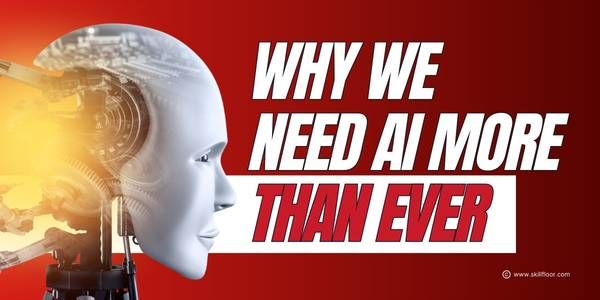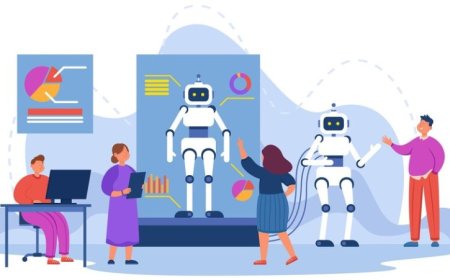Why Artificial Intelligence is Important
the importance of artificial intelligence (AI) in everyday life. Learn how AI boosts productivity, improves decision-making, enhances healthcare, and automates tasks across various industries.

I remember my early experiences interacting with new technology, including data analysis and automation strategies. It was an exciting time, full of learning and curiosity. When I first saw a system using input data to make a judgment on its own, I was fascinated. I was shocked by the effectiveness of these systems and their potential influence on sectors including logistics, healthcare, and finance.
I took an AI course to expand my knowledge, which improved my understanding of data processing, machine learning, and decision-making models. I was able to develop and test AI solutions because to this course's combination of practical experience and theoretical understanding.
AI is already an essential part of daily life, from predictive analytics to smart assistants. My belief in AI's revolutionary potential for creativity and problem-solving has been enhanced by this experience.
What is Artificial Intelligence?
The creation of computer systems that are capable of carrying out tasks that normally call for human intelligence is known as artificial intelligence. Problem-solving, judgment, language understanding, and pattern identification are some of these tasks. Large data sets and algorithms are used by AI systems to learn, adapt, and perform better over time. Voice assistants, facial recognition, self-driving cars, and automated customer support are a few examples of AI in action.
Why Artificial Intelligence is Important
There are several powerful reasons enhancing the importance of artificial intelligence (AI), which cut across many domains and aspects of human existence. The following main ideas highlight the importance of it:

1.Automating Tasks
By handling time-consuming and repetitive chores, AI boosts productivity and frees up human labor for more strategic and creative endeavors. This is evident in sectors where AI effectively automates procedures, such as manufacturing, logistics, and customer service.
2. Better Data Analysis
AI can quickly analyze huge amounts of data and identify patterns, helping companies and organizations in making more informed decisions. This feature is useful in sectors where real-time information can lead to greater results, such marketing, finance, and healthcare.
AI analyzes patient data and medical visualization to help physicians identify diseases more quickly and accurately. Additionally, it speeds up medical research and helps in the development of individual therapy treatments, which enhances patient care and results overall.
4. Increasing Technology
AI is transforming how people live and work by enabling advances like digital assistants, smart home appliances, and self-driving automobiles. It serves as a basis for creating new technologies that improve daily functionality and ease.
5. Personalized Experiences
By understanding customer needs and behaviors, AI enables businesses to provide highly customized services. As shown by customized movie recommendations on streaming services or product recommendations on e-commerce websites, this raises consumer pleasure.
6. Solving Tough Problems
AI is particularly good at handling difficult problems with many moving parts, such as predicting weather patterns, designing urban areas, and maximizing traffic flow. This capacity for problem-solving facilitates improved planning and decision-making in a variety of fields.
7. Boosting the Economy
Productivity gains brought about by AI have the potential to significantly boost the economy and provide new job possibilities. Even though certain jobs might be automated, AI increases the need for qualified workers in integration, maintenance, and development.
8. Improving Safety
Systems with AI capabilities can identify patterns and possible dangers, improving fraud detection and cybersecurity. Predictive maintenance is another application of AI that makes sure equipment operates safely and prevents possible problems.
AI Trends to Expect
Transforming Business Operations
Artificial intelligence's role in changing business processes is a key factor in its importance. Businesses use AI to automate repetitive processes, which boosts productivity and frees up human employees to concentrate on more creative, strategic aspects of their jobs. For example, Predictive analytics helps to anticipate customer tastes in the retail industry, ensuring improved supply control and customized advertising. Although they work quietly in the background, AI-driven chatbots help with customer support, responding more quickly, and increasing user happiness in general.
In addition, AI systems are significantly fast than humans at analyzing large volumes of data. Businesses can use this capability to make data-driven decisions and quickly adjust to changes in the market. Businesses may stay competitive by using AI to analyze customer behaviour trends, optimize supply chain operations, and personalize user experiences, just to name a few examples.
Revolutionizing Education
The introduction of artificial intelligence is causing a change in educational institutions across the world. Platforms for personalized learning adjust to the unique requirements of each learner, making instruction more efficient and interesting.
For example, AI-powered solutions, can analyze how learners learn, point out areas in which they fail, and provide resources specifically designed to help them. Similarly, self-learning tools such as math solver AI, assist students in learning mathematical problems by providing step-by-step explanations, allowing them to learn at their own pace.
AI encourages lifelong learning outside of the classroom. AI is used in online training programs and courses to help students understand the course content by suggesting relevant modules based on their interests and progress. The scope of education has expanded as a result, becoming more inclusive and scalable.
Enhancing Healthcare and Medical Research
Artificial intelligence is essential to patient care, treatment planning, and diagnostics in the medical field. Consider a system that uses pattern recognition to scan thousands of medical records and find symptoms of disease much quicker than is possible with conventional techniques. AI algorithms are already being used in radiology to help identify abnormalities that may be early indicators of diseases like cancer.
Another aspect of AI is predictive analytics, which helps in predicting patient admissions and distributing resources correctly, hence enhancing hospital administration. AI has also greatly accelerated drug development since it can model possible drugs and predict the effectiveness of them, reducing short research timelines and speeding the introduction of new treatments.
Streamlining Financial Services
Another sector where artificial intelligence has made significant advances is finance. Artificial intelligence (AI)-powered fraud detection systems can identify odd activity right away, lowering the possibility of losing money. Additionally, by examining market trends and offering insights that support wise investment choices, AI helps financial advisors. Large-scale data processing and interpretation skills are essential for portfolio administration, assessment of risks, and customized services to meet the needs of specific customers.
AI-powered robo-advisors have gained popularity as tools to help consumers manage their personal finances. These technologies make financial management easier and less terrifying for regular users by allowing them to track financial goals, develop investment strategies, and even automate trades based on established standards.
Advancing Scientific Research
The introduction of artificial intelligence has advanced scientific research. By filtering through huge amounts of data and identifying patterns that may not be visible to the human eye, machine learning algorithms help researchers. This has resulted in breakthroughs in domains like astronomy, where artificial intelligence (AI) detects previously invisible distant celestial objects and events.
AI helps in running simulations that test ideas and predict results, saving money that would otherwise be used for actual tests. Research in fields like genetics, physics, and material sciences has accelerated due to this type of processing capacity, creating new opportunities for creativity.
Enhancing Personal Productivity
Artificial intelligence is an essential component in increasing individual productivity on a more personal level. Virtual assistants enable hands-free completion of work, reminder setting, and schedule management. These AI-powered apps make everyday tasks like sending emails, finding information, and scheduling meetings more efficient.
AI is used in productivity tools to evaluate work patterns, prioritize activities, and provide more effective ways to manage workloads. This feature enhances time management and productivity by removing the distraction of manual planning and allowing individuals to concentrate on important tasks.
The significance of artificial intelligence is highlighted by how it fits into many facets of daily life. AI is changing the world in real and significant ways by automating repetitive tasks, improving decision-making, and increasing productivity across industries. It is impossible to overstate the significance of artificial intelligence in fields ranging from business and healthcare to education and sustainability. AI is an essential part of future developments due to its capacity to both solve problems and open up new opportunities as it develops.
Knowing the significance of artificial intelligence enables us to fully understand its effects, making sure that while we accept new technologies, we continue to be aware of how we may use them to promote positive change. We can create a future where technology enhances human potential and promotes advancement for all by carefully utilizing AI.
FAQs
1. What is artificial intelligence?
Computer programs created to carry out operations that normally demand for human intellect, like pattern recognition, language comprehension, and decision-making, are referred to as artificial intelligence.
2. Why is artificial intelligence important?
AI is significant because it facilitates effective decision-making, increases productivity, and advances a number of industries, including healthcare, education, finance, and transportation.
3. How does AI impact daily life?
Virtual assistants, tailored suggestions on streaming services, navigation apps, and more are examples of how AI affects day-to-day living.
4. What are some applications of AI in business?
Business applications of AI include supply chain optimization, predictive analytics, data analysis, and customer service automation.
5. What trends can we expect in AI?
More complex machine learning models, greater use in sustainability initiatives, improvements in healthcare applications, and enhanced user customisation are some of the trends in artificial intelligence.































































